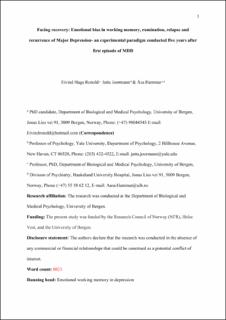| dc.contributor.author | Ronold, Eivind Haga | |
| dc.contributor.author | Joormann, Jutta | |
| dc.contributor.author | Hammar, Åsa | |
| dc.date.accessioned | 2023-04-04T07:25:37Z | |
| dc.date.available | 2023-04-04T07:25:37Z | |
| dc.date.created | 2019-03-04T19:09:00Z | |
| dc.date.issued | 2019 | |
| dc.identifier.issn | 2327-9095 | |
| dc.identifier.uri | https://hdl.handle.net/11250/3061946 | |
| dc.description.abstract | Identifying vulnerability factors for relapse of depression is essential in planning preventive interventions. Emotional face processing in major depression (MDD) shows promise as a potential cognitive marker for depression. The current study investigates how working memory (WM) load in face processing relates to rumination and new episodes of MDD in a novel explorative paradigm. It was expected that history of MDD is associated with reduction of the ability to process sad stimuli in high WM load conditions and reduction of the ability to process happy stimuli in low WM conditions. It was further predicted that these relations are associated with rumination and risk for relapse. The experiment was included as a cross sectional part in a follow-up study of a population that previously experienced first episode (FE) depression. The FE (N = 23) and a healthy control group (N = 22) completed a WM face processing task. In the task, three happy or sad faces were presented, processed in either a high or low WM taxing manner, followed by a target stimulus consisting of one of the previous pictures. Response time and accuracy were dependent variables. Rumination and number of relapses or recurrences were measured. The FE group recalled the placement of significantly fewer happy faces in the low WM load condition, and significantly fewer sad faces in the high WM load condition compared to controls. Significantly different scores between groups predicted trait rumination. Poor accuracy in the sad high WM load condition correlated with high degree of rumination. Relapse or recurrence was predicted by rumination. The present study supports an emotional WM deficit in remitted MDD. This suggests that deficits in manipulation of sad faces could represent a trait bias related to rumination and depression. | en_US |
| dc.language.iso | eng | en_US |
| dc.publisher | Taylor & Francis | en_US |
| dc.title | Facing recovery: Emotional bias in working memory, rumination, relapse, and recurrence of major depression; an experimental paradigm conducted five years after first episode of major depression | en_US |
| dc.type | Journal article | en_US |
| dc.type | Peer reviewed | en_US |
| dc.description.version | acceptedVersion | en_US |
| dc.rights.holder | Copyright 2019 Taylor and Francis | en_US |
| cristin.ispublished | true | |
| cristin.fulltext | original | |
| cristin.fulltext | postprint | |
| cristin.qualitycode | 1 | |
| dc.identifier.doi | 10.1080/23279095.2018.1550406 | |
| dc.identifier.cristin | 1682193 | |
| dc.source.journal | Applied neuropsychology: Adult | en_US |
| dc.source.pagenumber | 299-310 | en_US |
| dc.identifier.citation | Applied neuropsychology: Adult. 2019, 27 (4), 299-310. | en_US |
| dc.source.volume | 27 | en_US |
| dc.source.issue | 4 | en_US |
